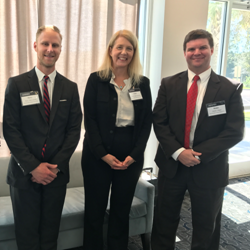HSB Blog

HSB Webinar Announcement: FMLA and ADA Compliance
March 13, 2025
Click here to view a recording of this complimentary webinar presented by HSB's Employment Law team.HSB Webinar Announcement: Employer Considerations When Handling FMLA Leave and ADA Accommodation Requests
March 09, 2023
Click here to view a recording of this complimentary webinar presented by HSB’s Employment Law team.AI Used in Hiring May Discriminate Against Applicants with Disabilities; EEOC and DOJ Issue Guidance for Employers
June 27, 2022
Many employers use Artificial Intelligence (AI) to reduce bias in hiring, yet studies indicate some AI is discriminating on the basis of disability. The Department of Justice (DOJ) and the Equal Employment Opportunity Commission (EEOC) have determined employers using AI in the hiring process may be discriminating against disabled applicants and employees. On May 12, 2022, the DOJ and EEOC issued technical guidance to employers on the use of AI and the steps employers should take to prevent discrimination.HSB DEI Webinar Series: Creating an Inclusive Workplace for Disabled Employees
September 02, 2021
The next two webinars in our DEI series will focus on what employers can do to create an inclusive and equitable workplace for disabled employees, addressing the legal requirements under the Americans with Disabilities Act (ADA) requirements, offering anecdotal experience from industry leaders as to the value brought to a company employing disabled employees, and resources for types of accommodations that may be considered.Should Employers implement mandatory COVID-19 vaccination policies?
December 10, 2020
Vaccines and health screenings are medical examinations under the Americans with Disabilities Act (ADA). An employer requiring a vaccine must do so for a legitimate business reason or as required to protect the workplace under analysis of the ADA’s "direct threat" standard.World Wide Web Commission Releases New Standards for Website Accessibility
September 12, 2018
When it comes to accommodating clients’ needs, whether your website is accessible to those with vision, hearing, or cognitive disabilities is not often a concern that readily comes to mind.
Key Takeaways from Our 2017 Employment Law Seminars
January 23, 2018
 Haynsworth Sinkler Boyd recently hosted our annual Employment Law Seminars across South Carolina. These complimentary seminars educated Human Resource professionals on recent employment law updates and changes.
Haynsworth Sinkler Boyd recently hosted our annual Employment Law Seminars across South Carolina. These complimentary seminars educated Human Resource professionals on recent employment law updates and changes.
Court's Ruling Requiring the EEOC to Reconsider Its "Wellness" Regulations
August 30, 2017
The ruling in the AARP v. EEOC case may be detrimental to employers and their healthcare plans because the EEOC may either reduce the percentage of its allowable inducement (or penalty) below 30% of the employee cost for participation in any employer-sponsored “wellness” program to be considered voluntary or possibly return to its former position that any reward or penalty renders participation involuntary.
Florida Court Rules Grocery Store Website is Subject to the ADA
June 28, 2017
Recently, the District Court for the Southern District of Florida held in Gil v. Winn-Dixie Stores, Inc., that Winn Dixie’s website violated Title III of the Americans with Disabilities Act (“ADA”), and awarded the plaintiff attorneys fees and injunctive relief. Many believe this to be the first trial regarding website accessibility to date.

